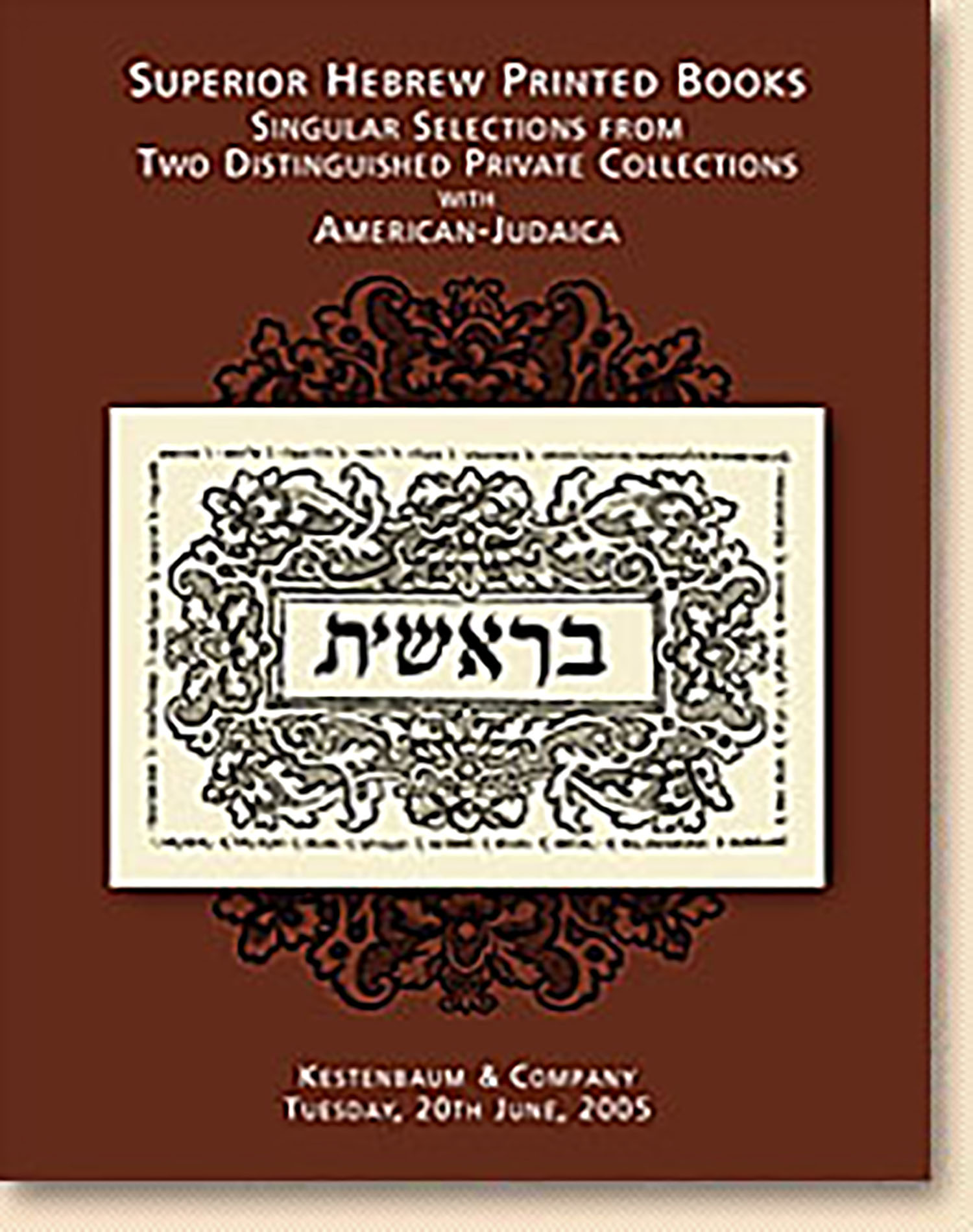Hebrew). With commentaries of Rashi, ibn Ezra, Kimchi (two), Targum etc

AUCTION 29 |
Monday, June 20th,
2005 at 1:00
Superior Hebrew Printed Books: Singular Selections from Two Distingushed Private Collections with American-Judaica.
Lot 6
(BIBLE,
Hebrew). With commentaries of Rashi, ibn Ezra, Kimchi (two), Targum etc
Venice: Daniel Bomberg 1546-8
Est: $12,000 - $15,000
PRICE REALIZED $27,000
A MAGNIFICENT CRISP COPY. A beautiful set of the third, and finest edition of Bomberg’s Rabbinic Bible.
The name of the printer on the title, “Daniel son of Cornelio Bombergi” is a bit misleading. Actually, in 1538 Bomberg departed for his birthplace of Antwerp, leaving behind in charge of his press the Jewish apostate Cornelio Adelkind. Adelkind’s involvement is attested to by several colophons in this Bible, all signed, “Cornelio Adelkind le-Beith ha-Levi.” (One notes with wry humor that though no longer a Jew by confession, Adelkind nevertheless continued to pride himself on his Levitic descent. It has been suggested that the Christian name “Cornelio” was adopted in honor of his employer’s father, Cornelio Bomberg.) Cornelio, whose name was originally “Israel,” was born in Padua to a German-Jewish family. Adelkind was considered a consummate master of the art of printing. The establishment of Bomberg in Venice continued to function under Adelkind’s able management for another decade until the year 1548 when it closed and Adelkind went to work under the auspices of Juan dei Farri and his brothers, and also Marco Antonio Justinian in Venice, and lastly at the press of Tobias Foa in Sabbioneta. “Cornelio…was the man to whom the work of Bomberg’s press owes much of that excellence which gained for it the admiration of contemporaries and established it as a model for later craftsmen.” Amram, p. 182.
See A.M. Habermann, Ha-Madpiss Cornelio Adel-Kind u-Beno Daniel (1980), pp. 7-13; D. Amram, The Makers of Hebrew Books in Italy (1963), pp. 180-189.
Vittorio Eliano, the censor of this copy of the Bible (1528-??) was a maternal grandson of the great Hebrew grammarian Elijah Bachur Levi (Elijah Levita), whence derives the surname “Eliano.” Prior to his conversion to Catholicism his name was “Joseph.” Vittorio Eliano, together with his younger brother Giovanni Battista Eliano, formerly “Solomon Romano” (1530-1589) have been held largely responsible for the burning of the Talmud in Rome in 1553, and later in Cremona in 1559. Vittorio became a censor of Hebrew books, first in Cremona, and later in Venice. Perhaps to his credit, he played some part in the editing of the Zohar produced at Cremona. (see Lot 59). How truly ironic that this apostate grandson of Elijah Bachur Levi should sign in his capacity as Church censor on precisely the page containing a poem by the great Hebrew grammarian, a devout Jew. The poem praises the handicraft of Daniel Bomberg, Elijah refers to him as a “chasid ha-umoth” (a pious man of the Nations). “He is uncircumcised of the flesh but not uncircumcised of the heart” (a reference to Ezekiel 44:9). Benayahu provides a glimpse of Eliano’s state of mind: “His soul was torn…He entered the world of Christianity but never truly left the world of Judaism. There were ups and
downs along his way. At times he so clung to his new faith that he caused damage to the Torah of his fathers; other times pangs of remorse would overcome him and faithful to the literary heritage of Israel, he would print and distribute the books of Israel’s sages.” Benayahu, p. 99.
See M. Benayahu, Hebrew Printing at Cremona: Its History and Bibliography (1971), pp. 95-99; Wm. Popper, The Censorship of Hebrew Books (1969), pp. 43, 54, 146; EJ, Vol. V, col. 1077; Vol. VI, col. 615; Vol. XI, col. 133; Vol. XII, col. 1525; Vol. XVI, col. 1212
